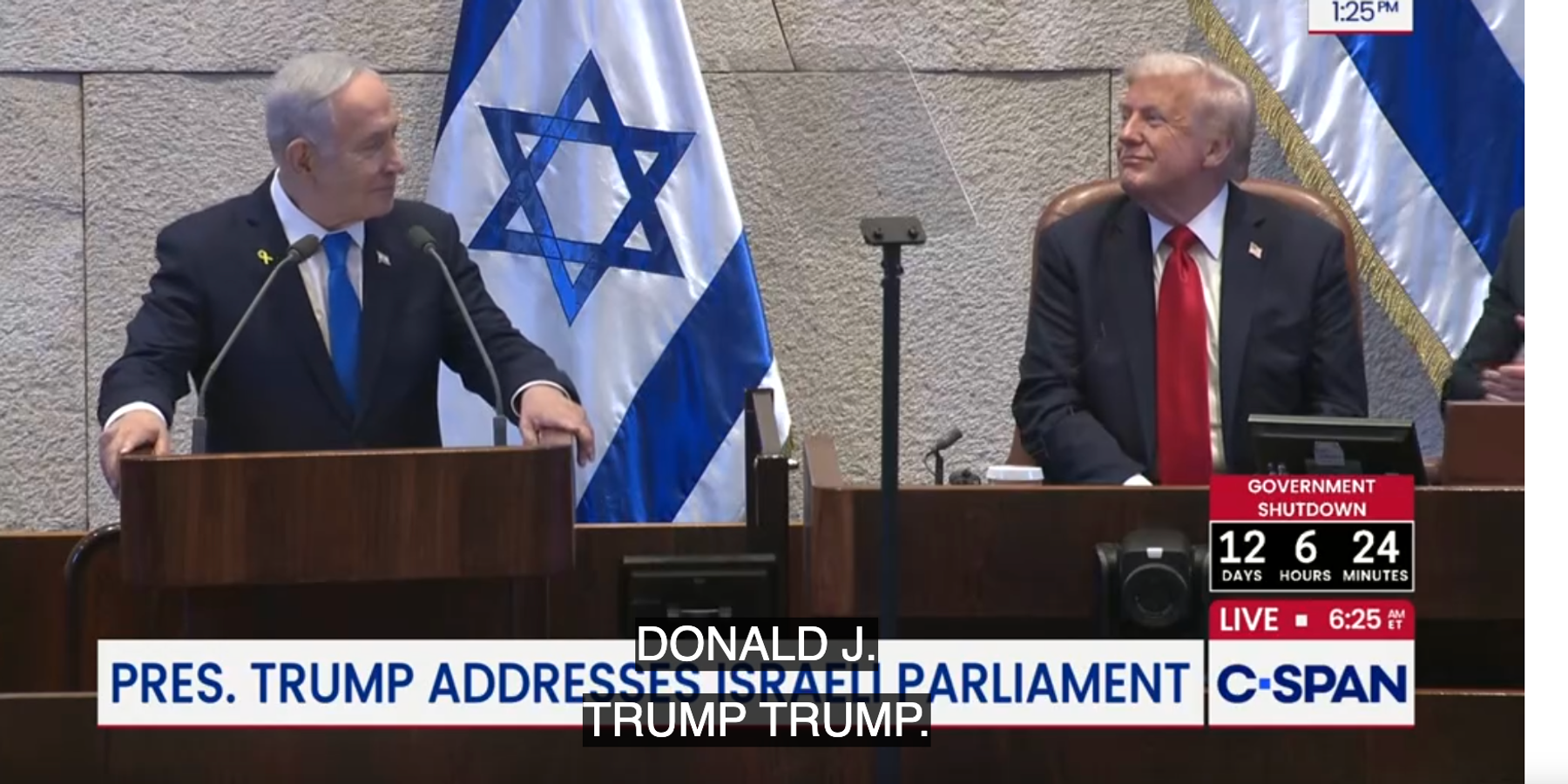Calling Donald Trump the "best friend Israel ever had in the White House" the Israel parliament welcomed the American president hours after the remaining 20 living hostages were released to Israel as part of last week's brokered ceasefire deal. As Trump prepared to speak before the Knesset, 2,000 Palestinian prisoners held by Israel were being readied for their own release.
In the lead up to his remarks, Knesset Speaker Amir Ohana thanked Trump for recognizing the capital of Israel as Jerusalem and for preventing Iran from being a nuclear power. He was then applauded for the day's hostage release. "You stand before the people of Israel, not as another American president, but as a giant of Jewish history, one for whom we must look back two and a half millennia into the mists of time to find a parallel. Cyrus the Great. Donald J Trump, you are a colossus who will join the pantheon of history."
"There is no single person on the planet who did more to pursue peace... in less than nine months you became one of the most consequential presidents in history," said Ohana, who said he and House Speaker Mike Johnson will be submitting a nomination for Trump to receive next year's Nobel Peace Prize. The 2025 recognition was bestowed on Venezuelan opposition leader Maria Machado last week.
Benjamin Netanyahu received a thunderous applause and a standing ovation when acknowledged in the Knesset audience, as did Israeli Ambassador to the U.S. Rob Dermer and Secretary of State Marco Rubio. "Secretary of War" Pete Hegseth was also recognized, as was Steve Witkoff — who got an added chant: "Witkoff, Witkoff" — Jared Kushner. and "absolute rock star" Mike Huckabee.
In his own remarks before Trump's speech, Netanyahu again ran down the litany of Trump's deeds for Israel, including recognizing the Golan Heights as Israeli, getting out of the Iran nuclear deal, the Abraham Accords, and bombing Iran in June. "Donald Trump is the greatest friend the state of Israel has ever had in the White House," he repeated, to chants of "Trump, Trump, Trump" in the audience.
Update 9:00 a.m.: Trump spoke for close to an hour to the Israeli Knesset Monday, often repeating a handful of themes: that he is the best friend Israel ever had, that previous Democratic presidents "hated" Israel, that his ending the war, in conjunction with Israel's military prowess, is a "miracle," and that the Jewish state is already in a state of a "comeback" with PM Benjamin Netanyahu — who should get a pardon, he said — at the helm.
With no mention of the Palestinians or collective punishment that left more than 67,000, most of them civilians, dead, and Gaza literally in rubble, Trump defied current international realities by suggesting the Israeli government was as popular as ever on the world stage:
You have people that really like Israel, I'll tell you what, and they like Israel a lot more today than they did even five weeks ago. Like you've made a come back, you've come back strong, because it was getting to be a little nasty out there in the world. And ultimately, the world wins. I would say to Bibi, Bibi, it's now time — and he understood it better than anybody, because ultimately, you know, the world's a very big place...I said this piece of land is very small. It's unbelievable what you've done with that tiny... you look at a map, even of just not the world, the Middle East, and you have this little dot and think of what you've done. It's incredible."
Trump spoke little about the United States itself, other to say that the country was "dead" before he became president and that it had been focused over the last two years on giving Israel billions of dollars in weapons and aid to wage its war. He spoke at length about his team — Witkoff, Kushner, his daughter Ivanka, Chairman of the Joint Chiefs Dan "Razin" Caine, and Rubio. He acknowledged Miriam Adelson and her late husband Sheldon whose billions made his own candidacy in 2016 possible and had lobbied him to do many of things he had been thanked for by the Israeli speakers earlier. He also spoke about the "beautiful" B-52s bombers he sent to Iran in June.
Now its time for "the ultimate prize for peace and prosperity for the Middle East," he said,
You know, the world wanted peace, and Israel wanted peace. Everybody did. Everybody did. And what a victory it's been, right? What a victory it's been. If you would have gone on for three, four more years, keep fighting, fighting, fighting. It was, it was getting bad. It was getting heated. The timing of this is brilliant. And I said, Bibi, you're going to be remembered for this far more than if you kept this thing going, going, going, kill, kill. It would be not, it would not be the same. And I just want to congratulate you for having the courage to say that's it, we've won, and now let's enjoy our lives, and let's rebuild Israel and make it stronger and better than it's ever going to be."
The morning's speeches took place ahead of peace talks in Sharm el-Sheikh on Monday, which would involve 20 countries, including the U.S. and Israel, and chaired by Egyptian president Abdel Fattah el-Sisi. Trump also led an elaborate signing ceremony with the Arab leaders Monday afternoon.

















